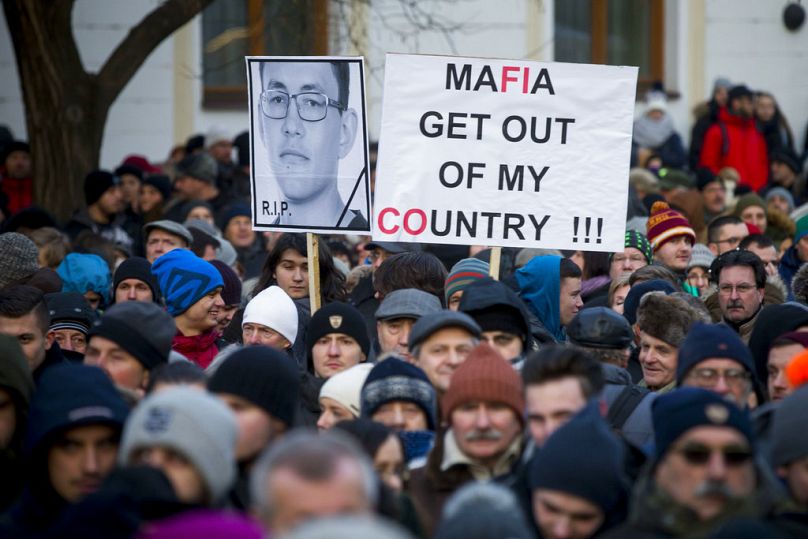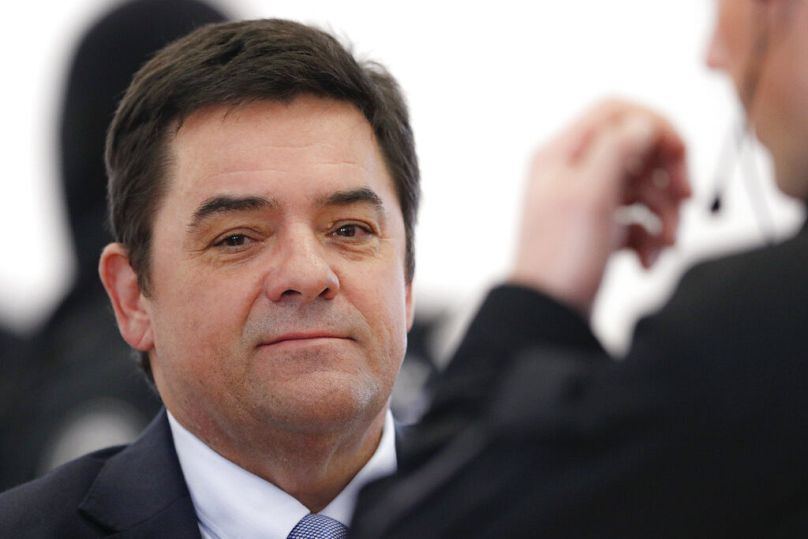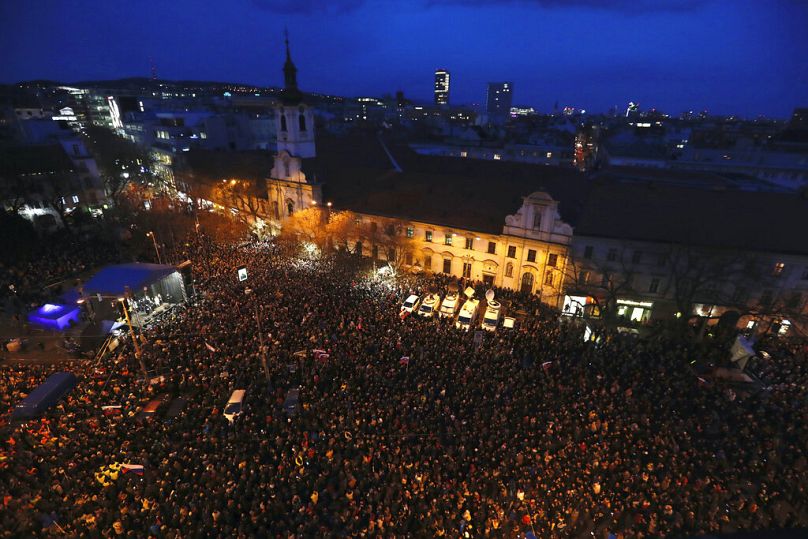Slovak tycoon Marián Kočner has been acquitted for his role in conspiring to murder journalist Ján Kuciak. Alena Zsuzsová, his associate, was found guilty of planning and ordering the crime.
A court in Slovakia has acquitted tycoon Marián Kočner for the second time on charges he conspired to murder journalist Ján Kuciak.
 ADVERTISEMENT
ADVERTISEMENT
 ADVERTISEMENT
ADVERTISEMENT
However, the District Court in Pezinok convicted co-defendant Alena Zsuzsavá of ordering and planning Kuciak's murder in February 2018. She received a 25-year prison sentence.
The pair were originally both acquitted in the original trial which began in 2019, and Friday's decision comes after an appeal was launched in 2021.
Parties can appeal Friday's decision to the country's Supreme Court.
What was this case about?
There is no doubt that the murder of Kuciak is among the most shocking murders of journalists in recent European history, along with that of Maltese journalist Daphne Caruana Galizia.
Both were targeted for investigating ties between government officials and criminal groups.
Kuciak was the younger of the two. He and his fiancée Martina Kušnírová were both 27 years old when they were killed in their home in Veľká Mača on 21 February 2018. The police found their bodies bearing gunshot wounds to the head and chest - injuries pointing to a possible assassination - after Kušnírová's mother alerted them to the fact that she could not contact her daughter.
The outrage in Slovakia was immediate and resounding, with the president at the time saying that he was "shocked and horrified" that such a thing had happened in the country and calling for either a cabinet reshuffle or an early election.
A number of ministers, members of parliament, police officers, and even Prime Minister Robert Fico — whose business ties were investigated by Kuciak — resigned in the wake of his death.
Protests and concerts demanding an end to corruption in the country were held for a month after the event.
Kuciak worked as an investigative reporter and data journalist for the Slovak news outlet Aktuality. The outlet’s editor in chief Petr Bárdy described him as someone with a knack for open source investigations and “connecting known things” to uncover tax fraud and corruption within the country’s leadership.
At the time of his death, Kuciak was writing an article — published posthumously as a collaboration between his colleagues — about the fraudulent activities of Italian businessmen operating in eastern Slovakia and their connections to the Italian 'Ndrangheta mafia clan, as well as their cooperation with representatives of SMER-SD party and PM Fico.
It was suspected that the murder involved cross-border crimes, so investigators from the Czech Republic, Italy, the FBI, Scotland Yard and Europol joined their Slovak counterparts in uncovering the perpetrators.
Slovakia’s trial of the century
In the early stages of the investigation, there were strong suspicions that controversial Slovak tycoon Marián Kočner, whom Kuciak also reported on, had something to do with the murder.
Despite being on several police mafia lists going back as far as 2005, Kočner had fashioned himself into a celebrity and often appeared on the country’s talk shows to bolster or promote his business activities.
The Kuciak murder exposed Kočner’s obsession with surveilling and following journalists in the country, in an attempt to control and discredit them or influence narratives in his favour. Even as late as 2021, the International Press Institute warned journalists from Dennik N that they were being followed.
According to the prosecution's indictment, Kočner tasked his associate and failed furniture business owner Alena Zsuzsová with arranging Kuciak's murder and she, in turn, tasked businessman Zoltán Andruskó, who ordered former soldier Miroslav Marček and his cousin Tomáš Szabó to carry out the murder.
Andruskó entered a plea agreement with the prosecution in December 2018 and was sentenced to 15 years — but also named Kočner as the individual who had ordered the murder. Marček received a 25-year sentence for killing the two, and Szabó received the same sentence for co-conspiring and assisting Marček.
Kočner and Zsuzsová were acquitted of charges related to the murders of Kuciak and Kušnírová at the time, with the court stating that their involvement in the murders could not be proven beyond a reasonable doubt.
There were widespread negative reactions to the verdict both in Slovakia and internationally, with President Zuzana Čaputová saying that she believed “the trial would not end here” and should be taken to the Supreme Court. Igor Matovič, a leading opposition politician at the time, said that the instigators of the murder had slipped out of the clutches of justice.”
The Supreme Court ordered a retrial of the case in 2021 and it was taken on by the Special Criminal Court.
Kočner and Zsuzsová were found guilty for other crimes in the meantime, the latter for her involvement in the 2010 murder of Laszlo Basternak, the mayor of a small town in Slovakia. They are currently serving sentences for those crimes.
When time came around for the appeals trial, the secret conversations between Kočner and Zsuzsová on the Threema — an encrypted messaging app developed by for the Swiss military and thought to be impenetrable — became public after a judge ordered them to be released.
Besides including incriminating messages sent by Kočner, including Kuciak’s private address, it also unveiled the extent of the tycoon’s inflated sense of self. His message to Zsuzsová were signed "Ave ja" in Slovak or "Hail me", which is a direct reference to the Roman phrase "Ave Imperator, morituri te salutant" or "Hail, Caesar, those about to die salute you," addressed to the Roman emperor by gladiators before games.
It also unveiled that Kočner referred to his political opponents in antisemitic terms, including a message that said "I'll probably have to cut down some Jews...” in May of 2018.
Kuciak as a symbol
Kuciak, his work, and his tragic demise have become the central European country's most powerful symbol for change.
Civil society groups and grassroots movements often refer to Kuciak in their statements and carry photographs of him and Kušnírová at protests and marches.
The Jan Kuciak Investigative Centre was established in his honour by journalists who worked with him, who said his murder inspired them to work more closely together in the future.
The landslide victory of opposition parties in the 2020 elections is also attributed to the widespread disgust felt among Slovak voters with the SMER-SD party that was in power at the time of his death.
So powerful is his image that former PM Fico, who lost power in 2020, has also tried to abuse his death for political gain and claims that one day he will reveal the true killers of Jan Kuciak. Fico’s party is currently gaining in support after a months-long political crisis in the country, buoyed by his embrace of conspiracy theories and far-right talking points.
For journalists in Slovakia, things continue to be difficult. On the anniversary of his death this year, the Jan Kuciak Center published a poll indicating that two out of three journalists in the country, or around 66%, continue to face threats on a regular basis.













